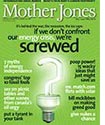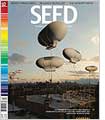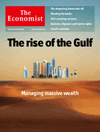The Great Green Tease
Mother Jones on the seven myths of energy independence.

Mother Jones, May/June 2008 As part of a cover package on sustainable energy, an essay identifies seven "myths" of energy independence—the first being that breaking an addiction to foreign fuel is possible or desirable. The political push for energy independence is "a populist charade masquerading as energy strategy" because "to build the energy economy we want, we're going to lean heavily on the energy economy we have."… Another piece reveals the "new global oil barons" who "could one day leave environmental and social activists nostalgic for the bad old days of ExxonMobil." Oil-rich countries, following the lead of Russia, Venezuela, and Iran, have begun leveraging the energy crisis to bolster government control of production and to drive out Western firms. In the past, activists could launch "PR campaigns to embarrass their Western oil partners" to control the offending regimes. But because of political pressure from soaring oil prices and the diminished influence of the old Big Oil, it's difficult to hold the "petrostates" accountable.

Seed, April 2008 An article investigates a new emissions trade concept that allows nations with forests to sell assigned credits on the carbon market. A "melding of economics and environmentalism," the scheme will "test whether markets can begin to drive the protection of the Earth's resources, rather than their exploitation."… A piece explores a theory of ancient mass extinction that suggests a poisonous cloud of hydrogen sulfide produced by ocean-dwelling microbes destroyed the ozone layer, killing most of the planet's inhabitants. But some mammalian ancestors survived, possibly with a kind of "suspended animation" induced by a small exposure to hydrogen sulfide that, as scientists have discovered in mice, pushes them into "the deepest of sleeps—with very slow, or even no heartbeats—for several hours." Reawakening when H 2 S levels subsided could have been how some animals survived and, if this mechanism exists in humans, "may provide a way of saving lives so revolutionary that it will change trauma medicine forever."

Economist, April 26 A piece argues that the recent clamor over corporate sponsorship of the "genocide Olympics" in Beijing "paints a false picture of the current relationship between business and human-rights activists." Rather than being adversaries, the article contends, it "is striking today is how often activists, big firms and governments are now in agreement about the importance of human rights, and are working together to advance them."… An article examines a study that shows life expectancy for U.S. women. The piece hypothesizes that the drop is connected to smoking and obesity-related diseases: "[T]he counties where life expectancy has fallen are nearly all in the South or Appalachia, where huge deep-fried portions are the norm and waistlines are among America's widest."… In a special report on Vietnam, a piece uncovers the country's transformation from "war-ravaged" to prosperous "darling of foreign investors and multinationals."

New York Times Magazine, April 27 The cover story reports on the first generation of young, gay, married men, many of whom "don't see themselves as all that different from their heterosexual peers, and … want what they've long seen espoused by mainstream American culture: a long-term relationship and the chance to start a family."… In a profile of Alaa al Aswany, the best-selling novelist in the Arabic language, Pankaj Mishra examines the "very small but vibrant civil society" of the writer's native Egypt: "After years of political and intellectual stasis, a new opposition has begun to rise among Cairo's middle class in response to an increasingly repressive state." Al Aswany's success in the Arab world and abroad comes despite the rejection of three earlier novels by the country's state-run press, which perhaps objected to his "obsessive urge to understand and explain the physical and moral rot of contemporary Egypt."

Time, May 5 Joe Klein's op-ed in the cover package on the Democratic nominee standoff observes that Barack Obama might not win the presidency if he doesn't "learn that the only way to reach the high-minded conversation he wants … is to figure out how to maneuver his way through the gutter."… A piece on patriotism among African-Americans argues that "[b]lack love of country is often far more robust and complicated than the lapel-pin nationalism some citizens swear by," even if "the words of black critics and leaders, taken out of context, can be read as cynical renunciations of country."… An article reviews the legal difficulties concerning parentage in the Texas FLDS polygamy case, noting that "[u]ntil investigators determine what did take place on the ranch, the judge will be left in the same troubled place where she began: with a lot of mothers who love their babies, and children who miss their homes, all caught between a world they fear and a world that is unraveling."
Must Read
As part of Mother Jones' cover package on energy, a piece debunks seven myths used to prop up the argument for energy independence.
Must Skip
Add another piece to the pile of articles arguing that Obama is not like JFK—he's more like [insert disappointing Democratic leader here]. This time, the Weekly Standard compares the Illinois senator to Jimmy Carter.
Best Politics Piece
An essay in the New Republic probes Obama's 16-month plan to withdraw from Iraq and attempts to illuminate some of the proposal's hazier details.
Best Culture Piece
A New York featureprofiles the debate among atheists on whether atheism "needs to stand for things, like evolution and ethics, not just against things, like God."
Most Likely To Inspire a Sci-Fi Plot
An article in Seed considers the possibility that a instinctive mechanism exists within humans to enter a state of "suspended animation"—a kind of deep sleep where our heart rate almost stops—following exposure to hydrogen sulfide.